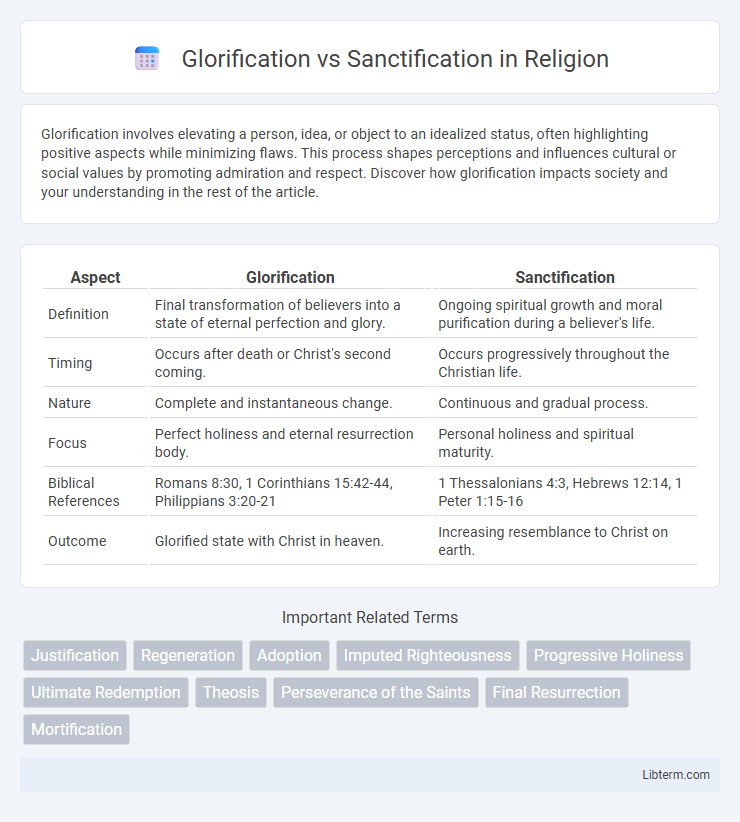Glorification involves elevating a person, idea, or object to an idealized status, often highlighting positive aspects while minimizing flaws. This process shapes perceptions and influences cultural or social values by promoting admiration and respect. Discover how glorification impacts society and your understanding in the rest of the article.
Table of Comparison
| Aspect | Glorification | Sanctification |
|---|---|---|
| Definition | Final transformation of believers into a state of eternal perfection and glory. | Ongoing spiritual growth and moral purification during a believer's life. |
| Timing | Occurs after death or Christ's second coming. | Occurs progressively throughout the Christian life. |
| Nature | Complete and instantaneous change. | Continuous and gradual process. |
| Focus | Perfect holiness and eternal resurrection body. | Personal holiness and spiritual maturity. |
| Biblical References | Romans 8:30, 1 Corinthians 15:42-44, Philippians 3:20-21 | 1 Thessalonians 4:3, Hebrews 12:14, 1 Peter 1:15-16 |
| Outcome | Glorified state with Christ in heaven. | Increasing resemblance to Christ on earth. |
Understanding Glorification and Sanctification
Glorification is the final stage of salvation in Christian theology, where believers are fully transformed into the likeness of Christ, free from sin and its effects. Sanctification is the ongoing process during a believer's life that involves spiritual growth, moral improvement, and increased holiness through the work of the Holy Spirit. Understanding glorification and sanctification clarifies the distinction between present spiritual maturity and the ultimate divine transformation promised in eternity.
Biblical Foundations of Glorification
Glorification is the final stage of the salvation process in Christian theology, rooted in biblical passages such as Romans 8:30 and 1 Corinthians 15:42-44, where believers are promised resurrection and transformation into a glorified, immortal state. It involves the complete perfection of believers' bodies and souls, reflecting Christ's resurrected glory as described in Philippians 3:21. This doctrine contrasts with sanctification, which is the ongoing process of becoming holy through the work of the Holy Spirit, emphasized in scriptures like 1 Thessalonians 4:3 and Hebrews 12:14.
Scriptural Basis for Sanctification
Sanctification is grounded in Scripture as the process by which believers are made holy, with key passages such as 1 Thessalonians 4:3 stating, "For this is the will of God, your sanctification." Hebrews 10:14 emphasizes that through Christ's sacrifice, believers are sanctified "once for all," indicating ongoing growth in holiness. Unlike glorification, which occurs at the final redemption, sanctification involves daily spiritual transformation empowered by the Holy Spirit according to biblical teaching.
Key Differences Between Glorification and Sanctification
Glorification is the final stage of salvation where believers receive perfected, glorified bodies free from sin, occurring after death or Christ's second coming, while sanctification is the ongoing process of spiritual growth and becoming more Christ-like during a believer's earthly life. Sanctification involves progressive moral and spiritual transformation through the Holy Spirit's work, whereas glorification completes this transformation with eternal perfection. Key differences lie in timing, purpose, and outcome: sanctification is a present, gradual purification, and glorification is a future, instantaneous perfection.
The Process of Sanctification in Christian Life
Sanctification in the Christian life is the ongoing process by which believers are progressively transformed into the likeness of Christ through the work of the Holy Spirit. This spiritual growth involves daily repentance, prayer, and obedience to Scripture, enabling Christians to overcome sin and exhibit holiness. The process culminates in glorification, where believers attain complete purity and eternal union with God after death.
Glorification: The Final Stage of Salvation
Glorification is the final stage of salvation in Christian theology, marking the complete transformation of believers into the image of Christ through the resurrection and eternal life. This stage involves the perfecting of the soul and body, free from sin and its consequences, reflecting the full glory of God. Unlike justification and sanctification, glorification is fully realized after physical death or the second coming of Christ, culminating in eternal union with God.
The Role of the Holy Spirit in Both Processes
The Holy Spirit plays a crucial role in both glorification and sanctification by transformative empowerment and spiritual renewal. In sanctification, the Spirit actively works within believers to cultivate holiness, guiding them away from sin and nurturing spiritual growth through ongoing conviction and strength. During glorification, the Holy Spirit completes the believer's transformation, preparing and renewing the body and soul for eternal perfection and full communion with God.
Common Misconceptions About Glorification and Sanctification
Common misconceptions about glorification and sanctification often confuse their distinct roles in Christian theology; glorification refers to the final transformation of believers into perfect holiness after death, while sanctification is the ongoing process of spiritual growth and moral improvement during a Christian's earthly life. Many mistakenly believe glorification involves gradual progress, but it is actually an instantaneous event at the resurrection. Sanctification is frequently misunderstood as self-achieved righteousness rather than being empowered by the Holy Spirit for holiness.
Practical Implications for Believers
Glorification completes the believer's salvation by perfecting them in heaven, ensuring eternal transformation free from sin, while sanctification is the ongoing process of spiritual growth and moral improvement during earthly life. Understanding glorification motivates believers to persevere through trials, knowing that sanctification is not final but a preparation for eternal holiness. Emphasizing sanctification encourages practical actions such as cultivating spiritual disciplines, resisting temptation, and fostering Christlike character in daily living.
Living in the Tension: Now and Not Yet
Glorification and sanctification represent key stages in Christian theology that highlight the tension of living between the "now" and the "not yet." Sanctification is the ongoing process of spiritual growth and moral transformation experienced by believers in this present life, while glorification refers to the future fulfillment of salvation when believers are perfected and fully united with God. This tension encourages Christians to pursue holiness amid present struggles, confident in the promise of ultimate redemption and eternal life.
Glorification Infographic

 libterm.com
libterm.com